- Home
- William Styron
The Suicide Run: Five Tales of the Marine Corps Page 2
The Suicide Run: Five Tales of the Marine Corps Read online
Page 2
He had felt it before, this cold excitement involving something to which he could hardly assign a name—challenge, perhaps, or summons to duty—at any rate a quickening of his senses so clamorous and memorable that in long periods when it was not there he had found himself waiting for it, waiting for the crisis with the tranquil, fierce patience of a communicant awaiting the moment of passion, or a hunter in the marsh watching the final defenseless swoop of birds. It was as if this morning he had once again and for the first time since Guadalcanal been given the call, ordained to bring to some sudden threat of disequilibrium a calm and unshakable sense of order. And he had rushed out into the swirling white dawn with a chill of delight up his back and with his mind clicking like an adding machine. Yet now as he watched the colonel rifling clumsily through his papers, something close to despair returned as he recalled how, instead of the escape being nipped off neatly, the sheep back in their fold, his very first glance at the ruptured window and bars separated so beautifully from their pinnings had told him that, this time, he would have little chance for triumph.
“I can’t find the main number of the F.B.I.,” the colonel said.
“I already called them, sir,” Blankenship put in.
The colonel looked up. “I should have known,” he said mildly. “I forgot. It’s in your special orders, isn’t it? And—”
“I called the rest, sir. The harbor and city police and the state police. I finally woke up some dogface over at Fort Slocum, and then I called the police in New Rochelle and in Nassau County. I also put in calls to the cops in those birds’ hometowns—Decatur, Illinois, and some little place in Wisconsin. They said they’d have their eyes peeled.”
A look of bafflement came over the colonel’s face, and perhaps of hurt, too, as if he had become impaled upon the keen cutting edge of Blankenship’s finesse. “By God, Gunner,” he said with a cramped little grin, “you got these birds all taped up.” He rose stiffly and went to the window and stood swaying there, dumpy and morose, hands locked behind him. There was little else to do, the two men were irretrievably gone, and Blankenship wished to be dismissed. He had not taped up anything; he had seized every proliferating growth of the emergency save its essential core. He had not caught those men—that was that—and he felt stuffed with sodden, inert disappointment, remembering how not four hours before and in spite of the sight of the neatly professional breakout he had still been possessed by that familiar chill, immaculate excitement, and his mind had worked with a clarity so pure, so aerial and flawless, that it seemed as if mounds of cobwebs had been torn away from his vision, and that he was suddenly looking for the first time at everything around him through the sheerest transparent glass. And how at that moment something more than logic—an intuition, rather—had told him that those yardbirds had built a boat. Even now he could only guess at how he had arrived at that remarkable judgment, a judgment which turned out to be not only remarkable but true; he only knew that he had known it, and instantly, with as much certitude as he knew his own name, rank, and serial number, and that armed with this certitude he had been spared going through the seven or eight hapless, groping steps of another man.
He had ordered the alarm sounded, and an immediate count, sending two squads of the guard up to the work area to hunt for a place or shed where a boat might have been built or hidden. And so not ten minutes later, tearing back from the armory through the greenly mounting light, strapping on his pistol, he was neither surprised nor even particularly gratified to hear some sergeant call out through the mist and over the shrill fantastic racket of the siren: “Gunner, we found a shed … a boat was—” because he already knew. He hadn’t answered, but had just galloped to the dock and commandeered one of the patrol boats he had ordered warmed up five minutes before, despairing even then—as the light came up dimly and revealed a Sound motionless and bare of all except a flock of swooping gulls—of finding anything, but touched still, almost to his soul, with this strange combination of fury and joy.
The colonel turned. “Gunner, just how did you know they had built this goddam boat, or skiff? Macklin told me you were out there on the water snooping around for a boat less than ten minutes after the alarm went off. If the guard had found that sprung window an hour before you’d prob ably have gotten those birds.”
“Well, one, sir, I figured they knew they’d freeze to death if they hit the water in this kind of weather. Two, the ferry stops at midnight. If they were going to try and smuggle themselves out in a truck or something on the ferry, they certainly wouldn’t make a breakout at night but just hide themselves sometime during the day and then try to get aboard. Three, the foggy night. Perfect to get lost in …” Blankenship halted. “I don’t know, sir. I guess I just felt this thing.”
“Remarkable, remarkable,” Wilhoite muttered and fell silent. He returned to his desk and sat down. Then he smiled, his words broadly explanatory, apologetic, and rather relieved, as if he had abruptly shifted from his shoulders a pack full of sand: “Well look, Gunner, it’s nobody’s fault, as I said. We’ve had a good record. I don’t think the Bureau will be down our necks for this. I’ll just put those recommendations of yours in effect and—” He raised his eyebrows and paused, and there was the same puzzling smile on his harried, honest face; but if his expression was meant to indicate some unspoken, possibly mysterious understanding between them, Blankenship had no idea what it was. For a moment the look seemed to transmit a sort of shy, quiet admiration, but whatever it might be Blankenship felt embarrassed and looked away.
“Yes sir?”
The smile faded. “Nothing, Gunner,” he said briskly. “I think that’ll be all.” When he arose, Blankenship got up, too. But then the voice became soft again, even wistful. “God, how I hate this job. I envy you First Division boys. Why the hell I couldn’t have gotten one of those Saipan regiments, instead of this … hooligans and eight-balls and jerks. I’ve put in sixteen letters in the past year but every goddam time I hear BuMed has turned me down on account of my lousy wheezing chest …” As he spoke Blankenship wished to shut his ears against this labored, querulous confession, but even so felt a mild tug of sympathy for such a man, past hope of glory and with time running out, who could still entertain some lustrous vision of fulfillment. Separated by a star and a pay grade and slight asthma from the goal of his life, he had already begun to wither. Old soldiers never died, it was true, especially if they were generals, but old colonels did; for among such reasons as that, Blankenship was content with his own world, where a man out of the pure comprehension of his duty might sometimes feel the keen, rapturous excitement he had felt that morning, and need not finally end up with skull battered to a pulp against a wall of politics and chance and ambition, like Wilhoite, in whose eyes already were specters of battles unseen and medals unwon and the slow final ooze of unlaureled retirement—of lawn chairs and rose gardens and horseshoes pitched in slumberous, dying arcs against the palms of St. Petersburg. The thought depressed Blankenship; he wished the colonel would stop talking and let him go. But when he finally did cease, with the words “That’s how it is, Gunner, those bastards at headquarters have you over a barrel every time,” Blankenship forced himself to smile—out of some momentary, curious sympathy.
“I know what you mean, Colonel,” he said. “I don’t much like brig duty, either.”
There was a knock at the door, which opened without a second’s pause to let in a chill gust of air from the corridors and a pretty blond woman of about thirty, sleek in furs. “Darling,” she said breathlessly, “I have to have—Oh, excuse me, I didn’t know anyone—”
“Suzie, I’ve told you—” the colonel began.
Blankenship moved toward the door. “That’s all right, Mrs. Wilhoite, I was just going.”
“Suzie, I’ve told you—”
“Webby, I have to get the eleven o’clock ferry, and I’ve got to have some money if I’m to see the caterers and do all those things—”
“Excuse me, Mrs. Wilhoite,
” Blankenship murmured, squeezing by.
“I’m sorry, darling,” she went on, “but I do have—Oh, Mr. Blankenship, you are coming to the party, aren’t you?”
“Which party is that, Mrs. Wilhoite?”
“Which one? The Thanksgiving party, of course, tomorrow night. You are Mr. Blankenship, aren’t you?”
“Yes,” he said, then quickly: “I mean yes, I’m coming, and I am Mr. Blankenship.”
She gave a small bright laugh, which he found himself echoing, rather foolishly, with a faint grin. “Oh good,” she said. “So many of you officers we never see, and I always get you confused with that—what’s his name?—Lieutenant—”
“Darling,” the colonel put in, “if you’re going to make that ferry—”
She turned and Blankenship slid away, pulling on his gloves. Outside the building, a cold damp blast of air struck him; he shivered, slanting his eyes toward the sky. It had become suddenly dim. Eclipse-like, a luminous corona surrounded the sun, and a shifting rack of mist, outriders of those great gray clouds which all morning had mounted to the north, brought a stiff wind and the promise of snow. The asphalt expanse of ground was deserted, except for a dozen gray prisoners in the distance, marching dejectedly in column and guarded by a lone marine. Against the advancing overcast the buildings, the brick towers and battlements, seemed to take on a sudden baronial and oppressive splendor; here and there lights winked on, though it was nearly noon. There was something in the scene hinting too much at the final white onset of winter; to Blankenship, with the climate of the tropics still steaming in his blood, it was touched by a vague sense of menace. Quickly descending the steps, he hurried toward his blockhouse, passing clumps of prisoners, pinched with cold, who arranged themselves in frozen and panicky attention when he approached. Yet as he muttered the usual “As you were,” he gave the prisoners hardly a glance, beset as he was with the same troubled feeling of anger and impotence he had had in the colonel’s office, which he had thought a breath of cold air might cure, but hadn’t.
Nor was it only the escape now, although as he thought of the escape again another pang of failure came like the quick blow of a fist at the pit of his stomach, when he remembered how in the boat at dawn, rounding a point of rocks—pistol unlimbered and feet braced against the spray-drenched gunwales and with the siren roaring in his ears like the ascending demented howls of souls chained in hell—he had thought, in one final and illusory moment of self-deception, that he had spotted those bastards. He had not, of course. What had appeared to be, in that fraudulent and compromising light, a boat had turned out to be nothing but a cardboard box heaved over some ship’s side. It had not been the quarry which he felt at that instant he would have literally sacrificed a leg or an arm to capture, but a maddening piece of driftage upon which the words HORMEL FINE SOUPS had been written and which, with its mirage-like deceit, gave him a second’s furious resolve to strangle the manufacturer of both soup and box. For he felt he had been tricked in the race at every turn. It was as if those yardbirds had been handicapped two lengths instead of the one length that was fair and just, and to this excessive advantage had been added the ultimate merciless ridicule of cunningly strewn debris, like soup boxes, in the wake of their victory. He had been tricked, all right, and as he strode toward the blockhouse entry he felt suddenly so abortively hollow and outmaneuvered that the feeling was close to exhaustion. Something else troubled him, too—something he knew he should be worrying about—but this, whatever it was, he banished from his mind when, at the entry to the blockhouse, he saw the look on Sergeant Mulcahy’s face and knew that more trouble was in the air.
Mulcahy’s chronically jaundiced expression was only in part due to the sourness of his nature, for he was still recovering from malaria. He was gaunt, ugly, with a crooked nose—a regular with fifteen years’ service. His contempt for the prisoners was both artless and profound. It was based simply, as he had expressed it to Blankenship, on the fact that the convicts, whom he referred to categorically as “skunks,” had all been experiencing blissful sexual connections in New York or Chicago while he was “out contracting the jungle rot.” He might have been a bully, except that his spleen had become so enfeebled by malaria and general world-and war-weariness that his only cruelty was an occasional drowsy prod or poke. “A little goosin’ don’t hurt ’em none,” he had said to Blankenship, but it was something which now and then he had to be called down on. At this moment his dilapidated, sulfurous face wore a look of the plainest disgust.
“What’s up?” Blankenship said.
“Ah, there’s some guy here thinks he’s top dog.”
“New man?” The gate swung open slowly, eased to behind Blankenship with a pneumatic hiss.
“Did you get those two birds this morning, Gunner?”
Mulcahy’s irrelevance, together with the renewed reminder of his failure, so annoyed him that he turned and snapped: “I said, goddammit, Mulcahy, is he a new man?”
Mulcahy drooped. “Yes, sir. Five days piss and punk.”
“For what?”
“Fighting. He just come in from B Company. Colonel had him up for office hours this morning.”
Blankenship entered the office, a corner room with enormous barred windows, while Mulcahy shambled in behind. “So what’s the trouble, then?” he said, sitting down. “What cell’s he assigned to?”
“Fifteen, sir. Well, Gunner, he just wouldn’t cooperate. This skunk comes in here with a bunch of smart-guy crap, saying how much he didn’t like the smell in here and all and how it ‘irritated’ him—that’s the word he used, Gunner, I swear to God—to have an outside cell where there was no view and only blower ventilation, and all. He was just running off at the mouth, that’s all. I mean I never saw such a smart son of a bitch—”
“So—” Blankenship, staring Mulcahy down, felt the blood rushing to his eyes in anger, and saw the sergeant’s freckled, sallow face sheepishly begin to crumble. “So—” he repeated.
“Well, Gunner, it was just a little tap right over the eye—”
“Goddammit, Mulcahy!” His fist thumped hard, painfully, on the desk, in a fury made thrice potent by the events of the morning. “I told you to keep your goddam Irish paws off these prisoners—”
“Gunner, I swear before God—” Protectively, Mulcahy rolled back his bleary yellow eyes. “It didn’t even make a br—draw blood,” he stammered. “I put a—”
“Quiet!”
“Yes, sir.”
“I’ve told you for the last time. You lay hands on these birds anymore and I’ll have you up before the colonel in two seconds. Do you understand that?”
“Yes, sir,” he said glumly.
“O.K. Now go get that man and bring him here.”
“Aye-aye, sir.”
“And give me that club,” he added, holding out his hand. “Some of you people are so goddam Asiatic you’d beat your own grandmother.”
Mulcahy exited in gangling, clumsy haste. Blankenship sank back in his chair, calmer now, faintly ashamed at his outburst, and reflecting that, after all and in spite of everything, Mulcahy was a good marine, and likable even if he was stunningly ignorant. But as he slumped slowly back, anticipating a few seconds’ rest—perhaps a catnap, even, to clear from his mind the morning’s tension—the siren, howling for the midday count, went off above him. It was a sound which, being so familiar, should not have disturbed him, but now in his frustration and weariness the noise seemed to pour through the walls in wildly ascending and racking gusts and, reaching its crescendo, to probe into his eardrums like lancets. One window was cracked open; he got up, scattering papers, and slammed it down. As he turned again, he noticed that his hands were trembling—a phenomenon so rare and strange that it caused him a fleeting sense of panic. Perhaps it was only a cold coming on, perhaps a recurrence of his malaria. He walked toward the wash basin, meaning to inspect his eyes in the mirror, but at this moment there was a knock. The door opened; as it did, the siren ceased its clamor,
falling swiftly earthward in a remorseful sullen groan.
“This here is the man, Gunner,” said Mulcahy.
Blankenship sat down, shooed Mulcahy out, and looked up to meet the prisoner’s gaze.
“What’s your name?” he said.
“McFee.”
For a moment Blankenship said nothing, for there was something familiar about this man; he was certain he had seen him before. This certainty was in itself curious enough, since few prisoners had memorable faces but only drab achromatic promontories upon which noses, mouths, and ears were struck like gray and similar shapes of putty. What was more striking now was the man’s expression. That, too, Blankenship recalled, from wherever and whenever it was: an aspect at first glance no different, in its wan sun-sheltered anonymity, from all the rest of the prisoners, yet swiftly and hauntingly unique—intelligence, perhaps? Perhaps no more than something in his level blue eyes which seemed halfway between scorn and defiance. Then Blankenship remembered: the face floating toward him through cigarette smoke and a confusion of laughter, a voice—“Drink, sir?”—too straightforward to be insolent yet touched with a whisper of mockery, and a parting smile, finally—like the one he wore now—that was not so much a smile as a smirk, expressing some mysterious and inner satisfaction. Of course. He had seen this man months before, working as a waiter at the only one of the colonel’s parties he had ever been to.

 Selected Letters of William Styron
Selected Letters of William Styron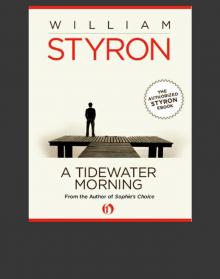 A Tidewater Morning
A Tidewater Morning Sophie's Choice
Sophie's Choice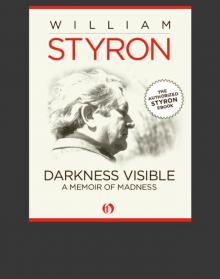 Darkness Visible: A Memoir of Madness
Darkness Visible: A Memoir of Madness My Generation: Collected Nonfiction
My Generation: Collected Nonfiction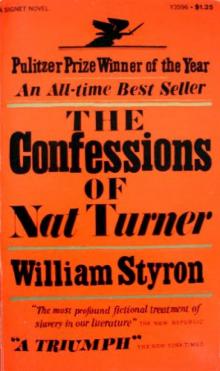 The Confessions of Nat Turner
The Confessions of Nat Turner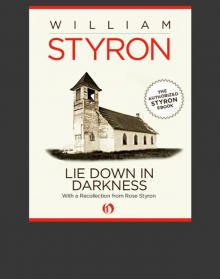 Lie Down in Darkness
Lie Down in Darkness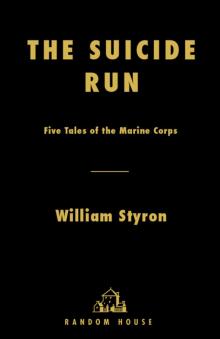 The Suicide Run: Five Tales of the Marine Corps
The Suicide Run: Five Tales of the Marine Corps Set This House on Fire
Set This House on Fire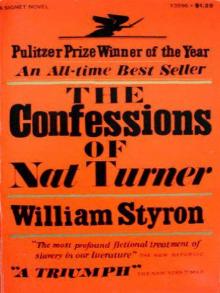 Confessions of Nat Turner
Confessions of Nat Turner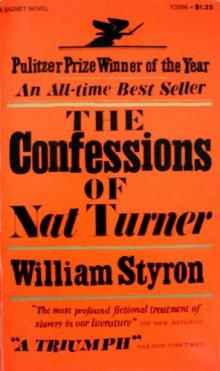 The Confessions of Nat Turner (1968 Pulitzer Prize)
The Confessions of Nat Turner (1968 Pulitzer Prize)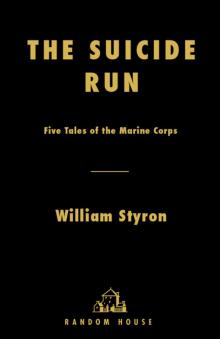 The Suicide Run
The Suicide Run My Generation
My Generation Sophie's Choice (Open Road)
Sophie's Choice (Open Road)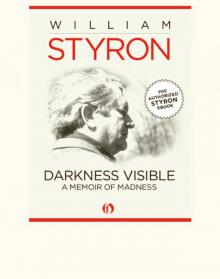 Darkness Visible
Darkness Visible